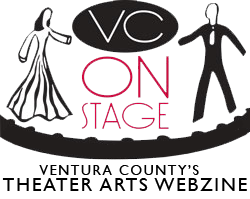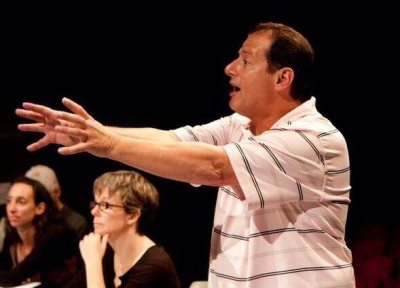BY CARY GINELL
Now that Bye, Bye Birdie has flown the coop, Cabrillo Music Theatre is heading down the home stretch of its fundraising drive, with its survival in the balance. A few weeks ago, I spoke with Cabrillo Artistic Director Lewis Wilkenfeld about the crisis. Lewis, who is never at a loss for words when talking about Cabrillo, gave me the lowdown on what is at stake and what the future promises for the company.
VCOS: First, let’s fill in my readers on why there is a crisis and why this needs to be done now.
LEWIS: OK. Cabrillo Music Theatre worked the last three years to get out of debt, and at this time, we are carrying no real debt, however, fundraising fell short this year – not even so much compared to previous years, about 40% less, but compared to where we need to be as a company. We are a non-profit organization and a theater company, so therefore, we get our income in two ways: ticket sales and fundraising. In that regard, we are no different than any other non-profit theater organization in the country. Everything depends on a combination of both.
We have modeled ourselves after companies across the country that seem to have a balance of 60-70% ticket sales for the total operating budget, and 30-40% from fundraising, which could mean donations, sponsorships, grants, raffles, what have you. So that’s how we structured it.
Last season we kind of found that balance, but this season we did not. And we found out that the reason was – and we blame no one but ourselves – that Cabrillo Music Theatre never really put the message out there that we are a non-profit organization and need support from the community in terms of donations and fundraising. Cabrillo was created in a different time when theater costs were much less. There were volunteer producers who took turns producing the shows and they tried to drive everything via ticket sales. They didn’t want big donors, in a sense, because they had experience with big donors before who wanted their granddaughter to play the lead and all of those kinds of things. So they wanted it to be kind of pure and just driven by the artists. So that was great.
Up until about three years ago, I don’t even think people were aware that we did fundraising. But we needed to. There had been a couple of fundraisers in the past; some were more successful than others. So we started doing our concert series fundraisers in the park, efforts at the theater and at Muvico, our fundraising movie series, but I don’t think we had really messaged to the community that, like every other arts organization, we required fundraising as well as ticket sales. So if you combine that with the theater raising its rates for next year, we were really trying to be responsible and say, well, you know what? We can’t charge into next season by starting in debt, because the minute we start doing shows, we’ll get deeper into debt if we’re not raising money. So we looked at what the shortfall was of fundraising and decided that we needed to raise this money.
Then we tacked on the costs to hire, at least part-time, a director of development to handle the fundraising. I don’t see the purpose in just getting back to where we were before, because that’s wearing me out. We just can’t do this massive, last-minute fundraising campaign to get back to where we were, because next year, we’ll be doing this again. I didn’t want that. We’ve done this without a director of development and without anybody in charge of fundraising for twenty years. It was time to start. So built into this drive is money to hire somebody for the first year, and then we want to get on the path to where fundraising is constantly a part of Cabrillo. Our goal is to develop a support base from the public who want the arts to continue.
VCOS: Tell me about the Civic Arts Plaza. Was this fundraiser in motion before they instituted their rate change for renting the theater to you?
LEWIS: No. The Civic Arts Plaza has been faced with their own issues and have their own challenges. Several months ago, they started discussions with us as well as with all the resident companies about things that were going to have to change. Part of the changes is to raise our rates. On one hand, this is an act of fairness because they’re really raising our rates to the level of the other resident companies. We had been getting a discount over the “public” rate, but there are two things involved. First of all, to me, the resident company rate was a two-sided coin. It was a handshake on both sides in the sense that they were getting less money from us than if Joe Blow had come in from the public and bought the exact same amount of stuff. But on the other hand, Joe Blow isn’t coming in and buying the exact same amount of stuff.
We’re making the commitment to be a resident company here in Thousand Oaks. We’re not a tour, we don’t move our shows to other cities, we’re putting local talent to work, we’re buying bulk, we’re Costco. And because of that, you get a better deal at Costco than you do at a regular store. And to folks who think that we’ve always had some kind of a sweetheart deal, it was a good agreement for both sides. We committed to fill eight weeks in their venue, so one-sixth of their year was booked. Even if nothing else happened, they could count on Cabrillo Music Theatre being there, bringing in money, and bringing people to the theater. And in exchange for that, they charged us less. The new deal brings us more in line with the other resident companies, but the challenge is that because we do everything here, on our rehearsal days, we have to pay as much as on any other day. The symphony doesn’t rehearse here. They rehearse somewhere else and just come in and do their concerts. Because we have the theater for two weeks, they want us to pay a rental fee for each one of those days, even though we don’t have shows on a Monday or a Tuesday. That’s all starting this fall. I don’t begrudge the city this. It’s what they feel they need to do to stay in business. They’ve come up with a business plan that is not necessarily the way I personally would do it or the way our board would do it, but it’s their problem to fix and we can’t begrudge them the way they chose to fix it.
VCOS: Now, part of your deal is that you are moving into the Scherr Forum to do one of your four shows.
LEWIS: Yes, now this is interesting. We had always wanted to do shows in the small theater. If I had my way, we would have done The Marvelous Wonderettes, The Andrews Brothers, Forever Plaid, and You’re a Good Man, Charlie Brown in the Scherr. And maybe even Ring of Fire. That’s where we wanted to do small shows originally. This was blocked by the previous leadership of Cabrillo and then later by elements within the theater because it would have been a lot of work to program us into two theaters. So when the theater asked us to move a show there, I said, “Great! Thanks for speaking my language.” We deliberately chose a show that was neither a small show like Forever Plaid nor a giant show shrunk down. Now you’ve come to every one of our shows. You know that when we did Once Upon a Mattress, we put the orchestra on stage, just like we did White Christmas. We showed that we could entertain the audience and not necessarily have a huge amount of costumes, but we could still put on a show, even though we may not have been able to find a set. So we were able to do it and the audiences loved it.
Eventually, my goal may be to do bigger shows shrunk small. I like the challenge of that, artistically, but we really wanted to find a show that was kind of right in the middle, a show that would benefit better by being in the small theater. I wanted to be able to find a show that would improve it by bringing it closer to the audience. So we picked Stephen Sondheim’s Company. We had a list of seven or eight shows that we were excited about, but Company was the one we chose. It’s never played professionally in that venue.
I went to my friend Nick DeGruccio, who won an Ovation Award for directing Jekyll and Hyde. He’s probably directed every Sondheim show except Company. So I asked him if he would be our torch bearer for this experiment in the new venue, and he was excited to do it. It’s always fun to work with people who get excited about a work, so we’re going to put on Company. We don’t know if it will sell; we don’t know if it will break even, we don’t know how it will work, but we’re excited to do it and we hope it leads to more.
I have plans to do more shows in the small theater. The theater only asked us to do three shows in the big theater, and more than that, they feel that one of their issues is that – and you’ll have to speak to the city about this – there aren’t enough dates to book one-nighters and single acts and stuff like that. Again, that’s the way they chose to solve their problems. There’s a school of thought that says, you know what? Develop your regional theater, develop your symphony and your other organizations, and you’ll have people coming back four times a year, every year. Our subscribers – many of whom have been subscribers for twenty years – have come to see Cabrillo shows eighty times. How many times will they come to see one comic once? So we’ve cleared out the time for our winter slot and we’re going to do Company.
VCOS: You get a trade-off, though. You get to do Company for three weekends instead of the usual two.
LEWIS: Yes, I’m excited about that, too. It lets us pick a show that maybe doesn’t have the name recognition and, instead, lets an audience find us. Company may not sell the first weekend, but by the third weekend, we think the word of mouth will be really good on this show.
VCOS: Are you prepared to do any budgetary cuts for the bigger shows in the Kavli?
LEWIS: The truth is that our shows’ budgets are already cut to the bone. Personally, I’m not a fan of cutting quality. We’re probably where we ought to be. We’re running on fumes. Every dollar we have is on the stage. Are we going to start cutting the live orchestra? No. Because then we’ll look like the touring shows that come through here. Are we being outrageously frivolous about it? No. We have the right amount of musicians in our shows to do justice to those shows. We didn’t do Bye, Bye Birdie with a six-piece band. We want to do justice to these shows, and that’s our first responsibility. We don’t have much to sell if we can’t sell quality.
VCOS: The first thing people say when they see this $250,000 goal you set for yourselves is, if you don’t reach it, will you shut down?
LEWIS: Yes. We will definitely shut down. Actually, we need to reach 80% of it, which only covers the budgetary shortfall; it doesn’t solve my ongoing need for a real fundraising person. But it’s more than that. We actually need to get our subscription numbers up. There is a scenario where we could hit $250,000 and not have enough subscribers. That has to do with how the box office holds on to our money. We can’t get money upfront from our upcoming shows, so if we haven’t made X amount of money for the season by the time we close Bye, Bye Birdie, we still have to start spending that money. We have to put on Memphis and Company and Mary Poppins and Oklahoma! without having access to most of that money. So the subscription numbers have to go up, and that’s why we’ve made a really strong pitch. Our postcards just landed in 61,000 mail boxes this week. That’s our only marketing campaign, plus an e-blast to follow it. We didn’t do a brochure this year, we’re not buying ads in the papers because we don’t have the money; the board was being responsible – we can’t spend money we don’t have. So if we don’t hit 80% of our goal, we’re returning all the money we’ve raised.
VCOS: Worst case scenario: if Cabrillo shuts down, what becomes of you?
LEWIS: You know, it’s interesting. I don’t think I’m going to go back to being a director for hire again because it was really hard when I was younger, and it was a hustle getting those jobs. To be honest, I don’t sell myself well. I sell Cabrillo pretty well, but I’m not a salesperson. I don’t know. I am told that due to the added responsibilities I’ve taken on in the last few years, that I probably have some marketable skills that I didn’t have when I was “just” a director. I expect there will be a couple of companies that will hire me to do a show a year for them, and I can do that without working that hard. I want to work hard, but I don’t want to work hard getting jobs.
It’s funny. I’ve had this position now for eight years. Before that, no job I had lasted longer than six weeks. I was a director for hire. I’d go, I’d audition people, I’d come back and rehearse, it opens, it closes, and I’m done. It’s always interesting to me that there are folks who feel like they’re entitled to a job for their whole lives. I run into a lot of them in the building where I work. But because I’m in the arts, I’ve never thought that. Anything can vanish at any moment.
We at Cabrillo Music Theatre are not entitled to stay in business. We’re not entitled to bring Broadway to the community. If the community wants us here, they’ll show their support, and we’ll be here. If not, we understand, and we’ll fold our tent. What happens to me? I don’t know. I’ll start by cleaning up the house a little bit, see my wife a little bit more, and get reacquainted with the honey-do list. I’ll survive. This is the best job I’ve ever had. I love doing it. I love putting on the shows. I love meeting the people. I love the outreach that we do. I love giving these young people a chance. And I hope we never stop. But there’s something I do know – it’s something that has been said to me at the theater – if Cabrillo Music Theatre closes, nothing else will ever happen there. No new company will start. It will just be concerts and recitals and tours. That’s it. There’s no way to start up something new there. But hopefully, the community will rally to support us.
**************
To donate to Cabrillo Music Theatre, or to purchase season tickets for their 2014-2015 season, visit http://www.cabrillomusictheatre.com






Niki M
•10 years ago
This past Spring, Cabrillo hooked up my low-income students from Pacoima with tickets to In the Heights. It was a life changing experience.
I’ve been involved in theatre since I was a very small child, and I don’t think I have ever experienced such an amazingly warm, welcoming group as the cast and crew of In the Heights. Not only did the show truly touch my students, but putting them backstage and on stage in that beautiful theatre, to see a real set and what the view looks like from that angle, it flipped a switch in those kids. My students have plenty of experience on our high school stage, but most of them did not think of themselves as artists with a true future in theatre. This experience gave them hope. I think it was everything from seeing a show that respected their backgrounds and their language, to meeting actors who share their heritage. While theatre has grown increasingly diverse over the past decade, mainstream theatre as a whole still significantly under represents the Latino community, leaving students like the ones I teach with few role models. In the Heights showed my students that the theatre world values the talent, culture, and spirit of the Latino community. For this, I will forever be grateful.
At the end of the night, our bus home was missing, which ended up being a blessing in disguise, as I would have otherwise been the obliging teacher to rush them quickly home, but the delay provided an opportunity for my students to “rub elbows” with the stars, which was a treat like no other. God bless Lano Medina who stood and smiled and graciously let practically every girl in my class (and I think even some of the boys) take an individual picture with him.
Again, I truly have never met a theatre group as kind, compassionate, and just truly wonderful as this one. I truly, truly, truly hope that they do not go out of business this year.